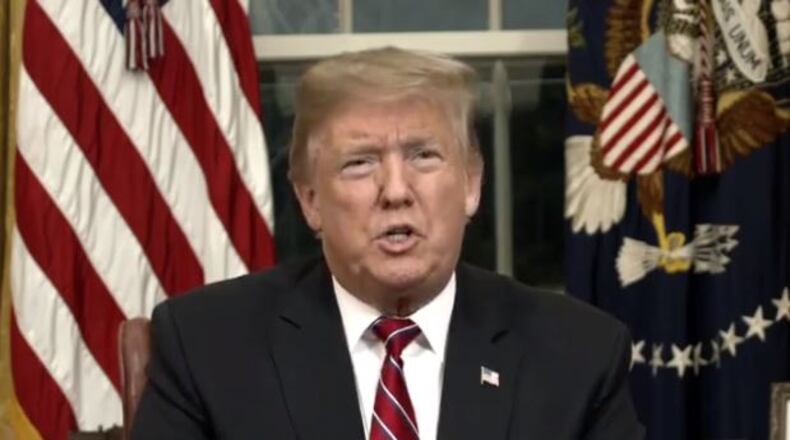After leaving lawmakers in both parties in suspense about a House-Senate deal on border security funding, the White House said Thursday afternoon that President Donald Trump had agreed to sign a group of spending bills into law to avoid a second partial government shutdown, but that the President would then immediately declare a 'national emergency' in order to funnel money from other projects into additional border security measures, a move which was immediately denounced by Democrats, and is certain to draw legal challenges.
"I've just had an opportunity to speak with President Trump," said Senate Majority Leader Mitch McConnell, who assured his fellow Republicans in a short speech on the Senate floor that the President would sign the funding deal, avoiding a second partial government shutdown starting on Friday night.
"He's prepared to sign the bill - he will also be issuing a national emergency declaration at the same time," McConnell added, as the Kentucky Republican then announced he would switch his views on that move, and support such a declaration - after previously making clear he opposed such executive action.
Less than an hour later, the Senate voted 83-16 to approve a package of seven spending bills, sending it to the House for final action on Thursday night.
"We have a full blown crisis of illegal immigrants and illegal drugs crossing the southern border," said Sen. David Perdue (R-GA), a key ally of the President on Capitol Hill, as Republicans said more money was needed than what negotiators had approved for the border.
"The four Presidents from George H.W. Bush, all the way to President Obama have built border barriers," Perdue said in a Senate floor speech, "because they all agree that this is a crisis."
The President had asked for $5.7 billion in funding for border security and a border wall - but negotiators approved only $1.375 billion, less than what the Senate had originally agreed to do last year - as the President lost ground with Congress following a five week partial government shutdown which held back paychecks to some 800,000 federal workers.
It was not immediately clear where the President would grab money, in an effort to shift that into border security - as many lawmakers, even Republicans, believe such a move would be unwise at best, and unconstitutional at worst.
"We'll wait and see what he does, and respond to that based on the legal theory and the statutory authority," said Sen. Mitt Romney (R-UT).
Democrats were less charitable.
"The real emergency is the Constitutional crisis that Trump is creating," said Rep. Hank Johnson (D-GA).
"Congress will defend our Constitutional authorities in every way," said Senate Democratic Leader Charles Schumer.
"The President is doing an end run around the Congress and the power of the purse," said House Speaker Nancy Pelosi, who reserved the right to lead a legal challenge against any emergency declaration.
"Any effort to take funding away from our military to support the President’s vanity project is reckless and irresponsible," said Sen. Sherrod Brown (D-OH), who told reporters the idea was 'an abuse of power.'
"Calling a border wall a national emergency is absolutely unlawful," said Sen. Bernie Sanders (I-VT)
About the Author
The Latest
Featured



